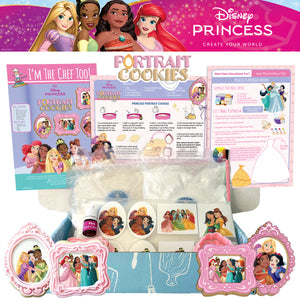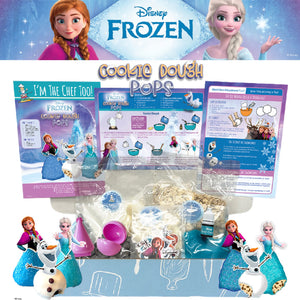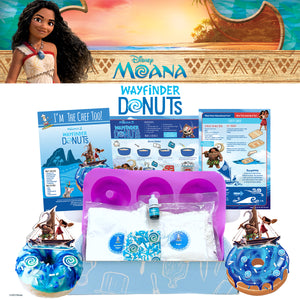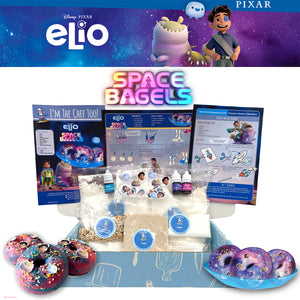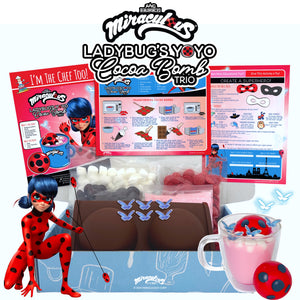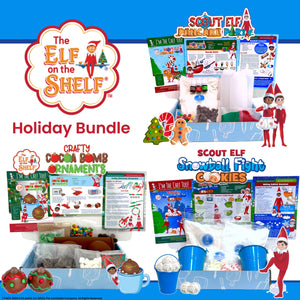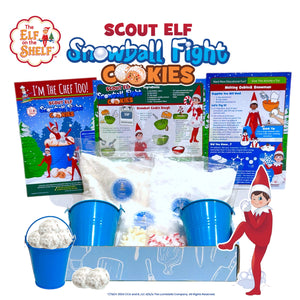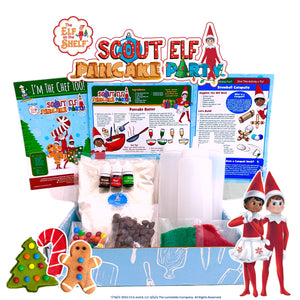Homeschool STEM Projects: Sparking Young Minds

Table of Contents
- Introduction
- Why STEM Matters So Much for Homeschoolers
- The Unique Blend: Food, STEM, and the Arts with I'm the Chef Too!
- Getting Started with STEM Projects at Home
- Deep Dive into STEM Disciplines for Homeschoolers
- Integrating the 4 Cs: Cultivating Collaboration, Creativity, Communication, and Critical Thinking
- The Power of Edutainment: Why I'm the Chef Too! is Perfect for Homeschoolers
- Beyond the Kitchen: Expanding STEM Learning
- Setting Realistic Expectations
- Conclusion
- FAQ Section
Imagine a learning environment where curiosity isn't just encouraged, it's served up with a side of deliciousness. For many homeschooling families, that dream is a daily reality, but keeping every subject fresh, exciting, and truly hands-on can be a delightful challenge. How do we transform abstract scientific principles or complex mathematical equations into tangible, memorable experiences right in our own kitchens and classrooms?
The answer lies in embracing the power of hands-on STEM projects for homeschoolers. These aren't just mere activities; they are gateways to discovery, designed to ignite a lifelong passion for learning in science, technology, engineering, and mathematics. In the personalized world of homeschooling, STEM activities offer unparalleled flexibility, allowing us to dive deep into subjects that truly captivate our children, fostering not just knowledge but also crucial real-world skills.
This blog post will guide you through the exciting landscape of STEM education for homeschoolers, exploring why it's so vital, how to seamlessly integrate it into your curriculum, and how our unique "edutainment" approach at I'm the Chef Too! blends food, STEM, and the arts to create unforgettable learning adventures. We'll delve into practical tips for getting started, explore engaging project ideas across all STEM disciplines, and show you how to foster critical thinking, creativity, and collaboration every step of the way. By the end, you'll be brimming with inspiration and ready to spark profound learning experiences that extend far beyond the textbook.
Introduction
Picture this: your child, eyes wide with wonder, watching a homemade volcano erupt with vibrant, edible "lava," or meticulously measuring ingredients to create a delicious chemical reaction that results in perfectly fluffy cupcakes. This isn't just playtime; it's deep, meaningful learning, and it's precisely the magic that hands-on STEM projects bring to the homeschooling experience. In a world that's constantly evolving, equipping our children with strong foundations in science, technology, engineering, and mathematics (STEM) is no longer a luxury, but a necessity. Homeschooling provides a unique opportunity to tailor education, allowing us to delve into these subjects in a way that truly resonates with each child's individual interests and learning style.
Forget dry textbooks and endless worksheets; the real power of STEM education, especially for homeschoolers, comes alive through doing, creating, and experimenting. It's about empowering children to ask "why?", to hypothesize, to build, and to discover the answers for themselves. At I'm the Chef Too!, we believe that learning should be an adventure, a multi-sensory journey that engages all aspects of a child's mind. Our mission is to blend food, STEM, and the arts into one-of-a-kind "edutainment" experiences, making complex subjects accessible and exciting through tangible, hands-on, and utterly delicious cooking adventures. Developed by mothers and educators, our unique approach is committed to sparking curiosity and creativity in children, facilitating family bonding, and providing a screen-free educational alternative that truly works.
Throughout this comprehensive guide, we'll explore the profound benefits of integrating STEM projects into your homeschooling curriculum, share actionable advice for setting up your home learning environment, and provide a treasure trove of engaging ideas across science, technology, engineering, and math disciplines. We'll show you how simple, everyday materials can transform into powerful learning tools, and how I'm the Chef Too! kits can be your secret ingredient for consistent, educational fun delivered right to your door. Get ready to embark on a journey where learning is not only effective but also incredibly fun, fostering a love for discovery that will last a lifetime.
Why STEM Matters So Much for Homeschoolers
Homeschooling offers an incredible landscape of educational freedom, allowing parents to craft a curriculum that perfectly fits their child. This flexibility is precisely why STEM (Science, Technology, Engineering, and Mathematics) activities shine so brightly in a homeschool setting. Unlike traditional classrooms, where a rigid schedule might limit deep dives into experimentation, homeschoolers can linger on intriguing topics, follow rabbit trails of curiosity, and truly immerse themselves in hands-on discovery.
Building Essential 21st-Century Skills
The benefits of integrating STEM go far beyond mastering academic concepts. These activities are foundational for developing what are often referred to as the "4 Cs":
- Critical Thinking: Every STEM project presents a problem to solve, a hypothesis to test, or an outcome to analyze. Children learn to question, evaluate information, and form logical conclusions.
- Creativity: There’s often more than one way to approach a scientific experiment or an engineering challenge. STEM encourages imaginative solutions and out-of-the-box thinking. Can you build a bridge out of spaghetti that holds the most weight? What's the most innovative way to make a lava lamp?
- Collaboration: While homeschooling often emphasizes individual learning, STEM projects can be wonderful opportunities for family bonding and teamwork. Working together on a complex build or an elaborate cooking experiment teaches kids to listen, share ideas, and contribute to a common goal.
- Communication: Explaining an experiment's steps, describing observations, or presenting a design's functionality hones communication skills, both written and verbal. When your child proudly shows off their Erupting Volcano Cakes, they're not just sharing a delicious treat; they're communicating the science behind it!
These skills are not just vital for future STEM careers; they are universally applicable and empower children to tackle any challenge they encounter, from everyday problem-solving to complex professional endeavors.
Connecting Learning to the Real World
One of the greatest strengths of STEM projects is their ability to make abstract concepts concrete. It's one thing to read about levers in a book; it's another to build a working catapult and see how leverage affects projectile distance. It’s one thing to study chemical reactions; it’s another to watch baking soda and vinegar create a spectacular fizz that makes our Erupting Volcano Cakes bubble over with deliciousness. These real-world applications make learning relevant and exciting, helping children understand why what they're learning matters.
Fostering a Love for Learning and Resilience
When children actively participate in the learning process, they become invested. The joy of a successful experiment, the satisfaction of a working design, or the delicious reward of an edible creation fuels a genuine love for discovery. Equally important, STEM projects teach resilience. Not every experiment works perfectly the first time. Bridges might collapse, rockets might not launch as expected, and cakes might not rise. These "failures" aren't setbacks; they are invaluable learning opportunities, teaching children to analyze, troubleshoot, and try again with renewed determination. This growth mindset is perhaps one of the most powerful gifts STEM education can offer.
At I'm the Chef Too!, we wholeheartedly believe in this approach. Our kits are designed to turn learning into a tangible adventure, where children aren't just passive recipients of information but active participants in their own education. They learn by doing, tasting, and creating, fostering skills that will serve them long after the last bite is gone.
The Unique Blend: Food, STEM, and the Arts with I'm the Chef Too!
At I'm the Chef Too!, we’ve discovered a magical recipe for learning: blending the tangible excitement of food with the foundational principles of STEM and the boundless expression of the arts. We call it "edutainment," and it’s at the very heart of everything we do. Our mission is to spark curiosity and creativity in children, transforming abstract concepts into hands-on, delicious adventures that truly captivate young minds.
A Holistic Approach to Learning
Traditional education often compartmentalizes subjects, but the real world is inherently interdisciplinary. Our unique approach recognizes this by seamlessly weaving together multiple learning domains:
- Science: Children explore chemical reactions (leavening agents, acids/bases), states of matter (melting, freezing, baking), and biology (yeast activation, plant life cycles in edible gardens).
- Technology: They engage with tools, follow instructions (a form of computational thinking), and understand processes. The structured nature of a recipe, much like code, dictates a sequence of operations to achieve a desired outcome.
- Engineering: From designing the "structure" of a cake to ensuring ingredients are correctly proportioned for stability, children are constantly engaged in edible engineering challenges. They learn about measurement, proportion, and problem-solving if something doesn't quite go as planned.
- Mathematics: Precise measurements, fractions, ratios, geometry (shaping cookies, cutting ingredients), and timing are all fundamental to successful baking and cooking.
- Arts: The creative aspect of decorating, plating, and personalizing their culinary creations allows for artistic expression, enhancing fine motor skills and aesthetic appreciation.
This holistic approach means children aren't just learning isolated facts; they're seeing the interconnectedness of subjects, strengthening their cognitive abilities across the board.
Crafted by Mothers and Educators
We understand the challenges and aspirations of homeschooling families because we are mothers and educators ourselves. Our kits are meticulously developed with a deep understanding of child development, educational best practices, and the desire to create meaningful family experiences. We focus on:
- Age-Appropriate Content: Ensuring that the concepts and activities are engaging and accessible for various age groups.
- Clear, Step-by-Step Instructions: Making it easy for both children and supervising adults to follow along and succeed.
- Safety First: All activities are designed with safety in mind, implicitly understanding the need for adult supervision in the kitchen.
This commitment ensures that every I'm the Chef Too! kit provides a valuable, enriching learning experience that parents can trust.
Convenience Meets Education: Your Screen-Free Solution
For busy homeschooling parents, convenience is key. Our Chef's Club subscription boxes deliver a complete educational adventure right to your door every month. Imagine a new theme-based kit arriving, packed with pre-measured dry ingredients and specialty supplies, eliminating the need for extensive shopping or complicated prep. This means more time for learning and bonding, and less time scrambling for materials.
Our kits offer a fantastic screen-free educational alternative, pulling children away from digital devices and immersing them in tangible, multi-sensory exploration. This hands-on engagement fosters deeper learning, improves fine motor skills, and provides a much-needed break from digital screens.
Ready for a new adventure every month? Join The Chef's Club and enjoy free shipping on every box, bringing unparalleled convenience and educational fun directly to your homeschool!
Getting Started with STEM Projects at Home
Embarking on STEM projects for homeschoolers doesn't require a dedicated science lab or expensive equipment. The beauty of hands-on learning is its adaptability and the ingenious ways you can use everyday items to create powerful educational experiences. Here are some practical tips to help you get started and make STEM a fun, integrated part of your homeschooling journey.
Embrace the Mess (and Plan for It!)
Let's be honest: science can get messy, especially when you're involving enthusiastic young learners and edible experiments! Instead of viewing this as a drawback, embrace it as part of the fun.
- Designated Space: If possible, designate a "messy zone" for experiments. This could be the kitchen table covered with a dollar-store tablecloth, a counter, or even outside on a picnic table.
- Easy Clean-Up: Keep paper towels, sponges, and a trash can nearby. Disposable foil pans can also be great for containing spills and are often reusable.
- Aprons: Provide aprons for both children and supervising adults – they add to the "scientist" vibe and protect clothing.
Remember, the goal is exploration, and sometimes exploration leads to glorious, educational chaos!
Gather Simple, Everyday Materials
You'll be amazed at how many incredible STEM projects can be created using items you already have around the house. Think outside the box, or rather, inside your recycling bin and pantry!
- Pantry Staples: Baking soda, vinegar, oil, food coloring, sugar, salt, flour, cornstarch, various fruits and vegetables (for fruit batteries, DNA extraction, plant growth).
- Recycling Bin Gold: Cardboard boxes, paper towel rolls, plastic bottles, aluminum foil, newspapers, old magazines.
- Craft Supplies: Pipe cleaners, craft sticks, glue, tape, string, rubber bands, construction paper, balloons.
- Tools: Measuring cups and spoons, scissors, rulers, magnifying glass.
For those times when you want a complete, curated experience without the hassle of sourcing individual ingredients, our I'm the Chef Too! kits are a game-changer. Each box comes with pre-measured dry ingredients and specialty supplies, making it incredibly easy to jump right into a new adventure. Explore our full collection of one-time kits to find the perfect themed project for your next homeschool lesson!
Scheduling and Time Management
Integrating STEM projects doesn't mean overhauling your entire homeschool schedule. Start small and build momentum.
- Dedicated STEM Day/Afternoon: Designate one afternoon a week or a specific day for hands-on STEM activities.
- Flexibility is Key: Allow ample time for experiments. Unlike a timed worksheet, STEM encourages exploration, and sometimes the most profound learning happens when children are given the freedom to deviate from the instructions and test their own ideas. Schedule the activity time and then double it – you'll be glad you did!
- Integrate Naturally: Look for opportunities to weave STEM into existing lessons. Studying ancient civilizations? Build a catapult! Learning about fractions? Bake some cookies!
Cultivate a Growth Mindset: It's Okay to "Fail"
One of the most valuable lessons STEM teaches is resilience. Not every experiment will work as expected, and that's perfectly okay – in fact, it's often where the real learning happens.
- "What Went Wrong?" is a Learning Question: When an experiment doesn't yield the anticipated results, guide your child to analyze what happened. Was the measurement off? Was the procedure followed correctly? What could be changed next time?
- Emphasize the Process, Not Just the Outcome: Celebrate the effort, the curiosity, and the problem-solving journey, even if the final product isn't "perfect."
- "Try Again!" Encourage iteration. Scientists and engineers rarely get it right on the first try. This iterative process builds grit and analytical skills.
At I'm the Chef Too!, we frame our activities as adventures, where exploration and discovery are the primary goals. We aim to foster a love for learning, build confidence through hands-on success, and create joyful family memories, rather than guaranteeing specific educational outcomes in the short term. The long-term benefits of curiosity and resilience are what truly matter.
Deep Dive into STEM Disciplines for Homeschoolers
Let's break down each component of STEM and explore how homeschoolers can engage with exciting projects, often enhanced by our unique I'm the Chef Too! approach.
Science: The World Through a Curious Lens
Science is all about asking questions, observing, experimenting, and understanding the natural world. For homeschoolers, the possibilities are boundless, from exploring chemical reactions in the kitchen to studying biology in the backyard.
Chemistry: Edible Reactions and Everyday Magic
Chemistry doesn't have to be intimidating; it can be incredibly delicious and accessible.
- Volcanoes and Fizz: The classic baking soda and vinegar reaction is a staple. We take it a step further with our Erupting Volcano Cakes kit, where children learn about acid-base reactions while baking a delicious treat that visually demonstrates the scientific process. This introduces concepts like gas production (carbon dioxide) and exothermic reactions in a truly memorable way.
- States of Matter with Ice Cream: Making ice cream at home is a fantastic way to explore phase changes (liquid to solid), freezing points, and the role of salt in lowering temperature. It’s a hands-on chemistry lesson with a tasty reward.
- Lava Lamps in a Bottle: Create a mesmerizing non-electric lava lamp using oil, water, food coloring, and Alka-Seltzer. Children observe immiscibility, density, and chemical reactions creating gas bubbles.
- Invisible Ink: Lemon juice, a mild acid, can be used to write secret messages that become visible when heated. This explores the concept of oxidation and chemical changes.
- Milk Fireworks: A few drops of food coloring, milk, and dish soap reveal surface tension and how soap breaks it down, creating vibrant, swirling patterns.
Biology: Life Cycles and Edible Ecosystems
Biology is all around us, from the tiniest microbe to the tallest tree.
- Plant Growth and Hydroponics: Sprout seeds in a clear cup to observe root growth, or delve into the future of farming by building a simple hydroponic system. This teaches about plant needs (light, water, nutrients) and life cycles.
- DNA Extraction: Extracting DNA from a strawberry or banana is a surprisingly simple yet profound experiment that introduces basic genetics and cell biology.
- Edible Ecosystems: Building a terrarium (or even a miniature edible garden with herbs) can teach about interdependent relationships within an ecosystem.
- Fudgy Fossil Dig: Our Fudgy Fossil Dig kit connects directly to paleontology and geology, allowing children to excavate edible dinosaur fossils from a "dirt" cake, learning about stratigraphy and the process of fossilization in a delicious context.
Physics: Forces, Motion, and Sound
Physics explains how things move, interact, and generate energy.
- Roller Coaster Physics: Design and build mini roller coasters using paper, tape, and marbles. This teaches about potential and kinetic energy, gravity, and friction.
- Catapults and Projectiles: Building a simple catapult from craft sticks or cardboard demonstrates levers, force, and trajectories. Experiment with launch angles and projectile weights to explore cause and effect.
- Balloon-Powered Cars and Straw Rockets: These projects illustrate Newton's laws of motion (action-reaction) and aerodynamics, showing how propulsion works.
- Sound Waves: Create a simple speaker to understand how vibrations produce sound, exploring concepts like frequency and amplitude.
- Simple Machines: Explore levers, pulleys, wheels and axles, inclined planes, wedges, and screws through hands-on construction challenges using household items.
Astronomy: Beyond Our World
- Galaxy Donut Kit: Explore astronomy by creating your own edible solar system with our Galaxy Donut Kit. Children learn about planets, celestial bodies, and the vastness of space through creative decoration and delicious treats. This can lead to discussions about orbits, gravity, and the unique characteristics of each planet.
Technology: Tools, Systems, and Digital Literacy
Technology in STEM isn't just about computers; it's about applying scientific knowledge to practical purposes, designing tools, and understanding systems.
- Basic Circuits: Learn how electricity flows by building simple circuits that light up an LED or power a small buzzer. Our kits that focus on basic circuitry can be a fantastic way to introduce these concepts in a safe, hands-on manner.
- Coding Fundamentals (Unplugged): Introduce computational thinking without screens. Activities like "if/then" games, sequencing tasks (like following a recipe!), or creating algorithms for simple actions teach logic and problem-solving.
- Robotics (Entry-Level): Many inexpensive robotics kits are available that allow children to build and program simple robots, introducing them to mechanical design, sensors, and basic coding.
- Digital Tools for Learning: Utilize educational apps, online simulations, virtual field trips to museums, and engaging documentaries to supplement hands-on learning.
While I'm the Chef Too! focuses on tangible, screen-free experiences, our kits intrinsically involve technological principles: following precise steps, using tools (mixing bowls, spatulas), and understanding how individual components (ingredients) combine in a system to produce a desired outcome (a baked good). This structured approach builds a foundational understanding of systems and processes.
Engineering: Design, Build, and Innovate
Engineering is all about problem-solving through design, construction, and testing. It’s where creativity meets practical application.
- Bridge Building Challenges: Using materials like spaghetti, craft sticks, or even LEGOs, challenge children to design and build bridges that can support increasing amounts of weight. This teaches about structural integrity, weight distribution, and different types of trusses.
- Tower Challenges: Build the tallest free-standing tower using limited materials (e.g., marshmallows and toothpicks, newspaper and tape). This encourages creative design and understanding of stability.
- Water Filters: Design and build a multi-layer water filter using sand, gravel, charcoal, and cloth to understand purification processes.
-
I'm the Chef Too! Edible Engineering: Every baking project is an exercise in engineering. When children are following a recipe, they are essentially executing an engineering design plan. They learn about:
- Measurement and Proportion: Crucial for the structural integrity and taste of the final product.
- Material Properties: How different ingredients react to heat and mixing.
- Design Constraints: Working within the limits of ingredients and equipment.
- Troubleshooting: What happens if the cake doesn't rise or cookies spread too much? How can we adjust for next time?
Mathematics: The Language of STEM
Mathematics is the universal language that underpins all STEM disciplines. It provides the tools for measurement, analysis, and problem-solving.
- Kitchen Math: Cooking is a fantastic way to practice fractions, ratios, measurement, and even basic algebra. Doubling a recipe, halving ingredients, or converting units (teaspoons to tablespoons) are practical math lessons. Our kits inherently involve precise measurements, making math a natural and necessary part of the cooking adventure.
- Data Collection and Analysis: When conducting experiments (like the catapult challenge), encourage children to measure distances, record data, and graph their results. This introduces concepts of variables, averages, and visual data representation.
- Geometry in Building: Identifying shapes in structures (triangles in bridges, spheres in domes), understanding angles, and calculating area or volume are all integrated into engineering projects.
- Budgeting and Estimation: Create a mock grocery budget for ingredients, estimating costs and making choices, teaching practical financial literacy.
By integrating these diverse projects across the STEM disciplines, homeschoolers gain a comprehensive, hands-on understanding that goes far beyond rote memorization. It fosters an active, curious mind ready to tackle the challenges of the future. Ready to make learning a delicious and enriching experience? Join The Chef's Club and discover new STEM adventures delivered to your door every month!
Integrating the 4 Cs: Cultivating Collaboration, Creativity, Communication, and Critical Thinking
Beyond the core subject matter, STEM projects are powerful vehicles for developing the crucial 21st-century skills known as the "4 Cs": Collaboration, Creativity, Communication, and Critical Thinking. These aren't just buzzwords; they are essential life skills that empower children to thrive in any environment.
Collaboration: Learning Together
While homeschooling often focuses on individualized learning, STEM projects provide excellent opportunities for collaboration, whether within the family unit or with a small group of homeschooling friends.
- Family Teamwork: Many I'm the Chef Too! kits are perfect for families to complete together. Assign different roles: one child measures, another mixes, a parent supervises. This teaches children to work towards a common goal, share responsibilities, and appreciate each other's contributions.
- Problem-Solving Together: When an experiment doesn't go as planned, encourage children to brainstorm solutions together. "Why do you think the cake didn't rise?" "What ingredients could we adjust?" This collective troubleshooting strengthens analytical and cooperative skills.
- Group Projects: For homeschool co-ops or informal gatherings, larger engineering challenges (like building a group bridge or a complex Rube Goldberg machine) can be fantastic collaborative efforts, teaching negotiation, delegation, and mutual support.
Creativity: Thinking Outside the Box
STEM is not just about logic and rules; it's deeply intertwined with creative problem-solving and innovation.
- Open-Ended Challenges: Instead of always providing step-by-step instructions, occasionally present an open-ended challenge: "How can we make a car move without touching it?" or "Design a dessert that represents a galaxy." This encourages children to invent, adapt, and think innovatively.
- Artistic Expression: Our I'm the Chef Too! kits naturally integrate the arts. Decorating cookies, piping frosting, or arranging edible elements allows for imaginative expression and aesthetic design, proving that STEM isn't just about numbers and facts, but also about beauty and design. Even beloved characters can make learning fun, like when kids make Peppa Pig Muddy Puddle Cookie Pies – a perfect blend of baking, art, and imaginative play!
- Material Adaptation: Challenge children to use available materials in unconventional ways. Can a cardboard box become a solar oven? Can pipe cleaners create a stable structure?
Communication: Articulating Ideas and Discoveries
Effective communication is crucial for sharing ideas, understanding instructions, and presenting findings.
- Explaining the Process: After completing a project, encourage your child to explain what they did, step-by-step, to another family member. This reinforces their understanding and helps them articulate complex ideas clearly.
- Documenting Observations: Have children keep a "science journal" where they record hypotheses, materials, procedures, observations, and conclusions. This develops scientific literacy and writing skills.
- Presenting Results: Encourage "show and tell" sessions where children can present their creations, experiments, or discoveries. This builds confidence in public speaking and the ability to convey information engagingly. With our Galaxy Donut Kit, for instance, they can not only create an edible solar system but also present facts about each planet they've decorated.
Critical Thinking: Analyzing and Problem-Solving
At its core, STEM education is about honing critical thinking skills – the ability to analyze information, evaluate arguments, and make reasoned judgments.
- Hypothesis and Prediction: Before starting an experiment, ask "What do you think will happen and why?" This encourages children to think proactively and form logical predictions.
- Observation and Analysis: Guide children to observe carefully and describe what they see, hear, smell, and even taste (especially with I'm the Chef Too! projects!). Then, ask them to interpret their observations: "Why do you think that happened?"
- Troubleshooting: When things don't go as planned, resist the urge to immediately provide the answer. Instead, ask guiding questions: "What could we change?", "What did we do differently this time?", "What resources could help us solve this?" This iterative process of identifying problems, devising solutions, and testing them is the essence of critical thinking.
By intentionally fostering these 4 Cs through STEM projects, homeschooling parents are not just teaching subjects; they are building resilient, innovative, and well-rounded individuals ready to navigate an ever-changing world. Our I'm the Chef Too! kits provide the perfect framework for these integrated learning experiences, offering a balance of structure and creative freedom.
The Power of Edutainment: Why I'm the Chef Too! is Perfect for Homeschoolers
As homeschooling parents, we're constantly seeking engaging, effective, and convenient educational resources. This is where I'm the Chef Too! shines, offering a unique "edutainment" approach that perfectly complements the homeschool environment. We seamlessly blend the excitement of hands-on cooking with core STEM principles and artistic expression, creating unforgettable learning experiences delivered right to your door.
Unparalleled Convenience for Busy Parents
One of the biggest advantages of our kits is the incredible convenience they offer. We know that homeschooling parents wear many hats – teacher, curriculum planner, housekeeper, chef, and more. Sourcing materials for complex STEM projects can be time-consuming and sometimes frustrating.
- Pre-Measured Ingredients: Our kits arrive with most dry ingredients pre-measured, significantly cutting down on prep time and kitchen mess. No more last-minute trips to the grocery store for obscure items!
- Specialty Supplies Included: Unique tools, cookie cutters, sprinkles, or other special components needed for a themed project are all included, ensuring you have everything you need to start the adventure immediately.
- Free Shipping: Enjoy free shipping on every Chef's Club box within the US, adding to the value and ease of our monthly subscription.
This convenience means less stress for parents and more focused, quality learning time for children.
Curriculum Connections Developed by Educators
Our kits aren't just fun activities; they are thoughtfully designed educational tools. Developed by mothers who are also experienced educators, each kit is crafted to introduce and reinforce key STEM concepts in an accessible and engaging way.
- Integrated Learning: We intentionally integrate science, technology, engineering, and mathematics into every recipe and activity. Children learn about chemical reactions, measurement, structural design, and artistic expression, all within a single, cohesive project.
- Clear Learning Objectives: While the focus is on fun and discovery, underlying educational objectives guide the design of each kit, ensuring that valuable skills and knowledge are being imparted.
- Hands-On Application: Our kits move beyond theoretical knowledge, allowing children to apply concepts tangibly. For example, understanding fractions becomes concrete when measuring ingredients, and learning about density comes alive while layering colors in a dough.
Screen-Free, Hands-On Learning
In an increasingly digital world, providing screen-free educational alternatives is more important than ever. Our kits offer a refreshing break from screens, immersing children in multi-sensory experiences that engage their minds and bodies.
- Tangible Engagement: Children get to feel, smell, taste, and manipulate ingredients, fostering a deeper connection to the learning process. This tactile experience enhances memory and understanding.
- Fine Motor Skill Development: Mixing, rolling, cutting, and decorating all contribute to the development of crucial fine motor skills.
- Focused Attention: Without the distractions of screens, children can fully immerse themselves in the activity, developing focus and concentration.
Facilitating Family Bonding and Lasting Memories
Beyond the educational benefits, our kits are designed to be shared experiences. Cooking and creating together in the kitchen provides a natural environment for family bonding.
- Shared Adventure: Each kit is an adventure to embark on together, creating opportunities for conversation, laughter, and shared discovery.
- Teamwork and Support: Parents can guide, encourage, and troubleshoot alongside their children, fostering a supportive learning atmosphere.
- Delicious Rewards: The ultimate reward – a delicious treat – is something everyone can enjoy together, creating positive associations with learning and lasting family memories.
Flexible Options for Every Homeschooler
Whether you're looking for ongoing monthly adventures or a specific themed project, we have options to suit your homeschooling needs.
- The Chef's Club Subscription: For consistent, hassle-free educational fun, our monthly subscription delivers a new, exciting kit to your door with free shipping in the US. You can choose from flexible 3, 6, or 12-month pre-paid plans, perfect for long-term enrichment or as a thoughtful gift. Give the gift of learning that lasts all year with a 12-month subscription to our STEM cooking adventures!
- One-Time Kits: Not ready to subscribe? Explore our full library of adventure kits available for a single purchase in our shop. This is a great way to try out a specific theme or find the perfect project to complement a particular lesson you're teaching.
At I'm the Chef Too!, we are committed to providing realistic expectations. While we don't guarantee your child will become a top scientist overnight, we do promise to foster a love for learning, build confidence through hands-on success, develop key skills, and create joyful family memories. Our approach is about cultivating a curious mind and an adventurous spirit, one delicious experiment at a time.
Beyond the Kitchen: Expanding STEM Learning
While our I'm the Chef Too! kits bring a world of STEM discovery into your kitchen, the journey of exploration doesn't have to stop there. Homeschooling offers unique opportunities to expand STEM learning beyond structured projects, connecting it to everyday life and the wider world.
Field Trips and Experiential Learning
Nothing brings learning to life quite like a real-world experience.
- Science Museums and Discovery Centers: These institutions are treasure troves of interactive exhibits designed to engage children with various STEM concepts, from physics to biology to technology. Look for special homeschool days or programs.
- Nature Centers and Parks: Explore local ecosystems. Collect leaves for classification, observe insects, identify animal tracks, or learn about local geology. These outings provide natural opportunities for scientific observation and ecological understanding.
- Manufacturing Plants or Workshops: If available, a tour of a local factory or a skilled trades workshop (e.g., a woodshop, a robotics lab) can offer fascinating insights into real-world engineering and technology.
- Zoos and Aquariums: These provide excellent opportunities to learn about animal biology, conservation, and habitats, often with interactive educational programs.
Books, Documentaries, and Online Resources
Supplement hands-on activities with rich informational resources.
- Non-Fiction Books: Build a library of engaging non-fiction books on various STEM topics. Look for books with vibrant illustrations and clear explanations tailored to children.
- Educational Documentaries: Platforms like Netflix, Disney+, and public broadcasting channels offer a wealth of high-quality documentaries on space, nature, engineering marvels, and scientific breakthroughs.
- Educational Websites and Apps: While we champion screen-free learning, carefully curated online resources can supplement understanding. Look for interactive simulations, virtual labs, or reputable educational channels that explain complex concepts visually. Just be sure to balance screen time with plenty of hands-on engagement.
Connecting to Current Events and Everyday Life
The world around us is a constant source of STEM inspiration.
- Weather Watching: Observe and record daily weather patterns. Discuss meteorology, climate, and how weather impacts our lives.
- Household Appliances: Take a look inside (safely!) or research how everyday appliances work – the physics of a refrigerator, the engineering of a washing machine, the simple circuits in a flashlight.
- News and Discoveries: Discuss new scientific discoveries, technological advancements, or engineering feats reported in the news. How do these impact society? What problems are they solving?
- Cooking as Chemistry and Math: Reinforce the concepts learned from I'm the Chef Too! kits by pointing out STEM principles in everyday cooking – how yeast makes bread rise, why oil and water separate, or the precise measurements needed for a successful recipe.
Mentorship and Community Engagement
Connecting with others who have STEM expertise can be incredibly inspiring.
- Guest Speakers: If possible, invite a local scientist, engineer, technologist, or mathematician to speak (virtually or in person) about their work.
- Community STEM Events: Look for science fairs, maker faires, or university outreach programs in your area.
- Homeschool Co-ops: Join or form a co-op that focuses on STEM activities, allowing children to collaborate with peers and share resources.
By integrating these diverse avenues of exploration, you can create a truly comprehensive and inspiring STEM education for your homeschoolers, fostering a deep understanding and appreciation for how science, technology, engineering, and mathematics shape our world.
Setting Realistic Expectations
As parents and educators, it's natural to want the best for our children and to see tangible results from our efforts. When it comes to STEM projects for homeschoolers, it's important to set realistic expectations and understand that the most profound benefits often extend beyond immediate, measurable outcomes.
At I'm the Chef Too!, we are passionate about sparking curiosity and building foundational skills, but we also believe in fostering a love for learning rather than promising guaranteed academic mastery. Here's what to expect, and what to focus on, during your STEM adventures:
- Focus on the Process, Not Just the Outcome: Not every experiment will yield perfectly predicted results, and not every engineering build will stand tall on the first try. The true value lies in the process of questioning, hypothesizing, experimenting, troubleshooting, and analyzing. Celebrate the effort, the thinking, and the learning that occurs, regardless of the final product.
- Fostering a Love for Learning: Our primary goal is to make learning fun and engaging. When children enjoy what they're doing, they become intrinsically motivated to learn more. This love for discovery is far more valuable than memorizing isolated facts, as it fuels lifelong curiosity.
- Building Confidence Through Doing: Successfully completing a hands-on project, whether it's baking a delicious treat with a chemical reaction or building a working model, gives children a profound sense of accomplishment. This builds self-confidence and a belief in their own abilities to tackle challenges.
- Developing Key Skills: STEM projects are unparalleled in cultivating critical thinking, problem-solving, creativity, and communication skills. These are not always immediately evident but are being honed with every measurement, every design tweak, and every explanation.
- Creating Joyful Family Memories: The shared experience of cooking, experimenting, and discovering together creates precious family memories. These moments of connection and shared laughter are invaluable, strengthening family bonds while children learn.
- Adult Supervision is Key: While our kits are designed to be child-friendly, all kitchen and science activities inherently require adult supervision for safety, especially when using ovens, stoves, or cutting tools. We implicitly understand and recommend that parents or guardians always oversee these activities.
Remember, every step, every question, and every "aha!" moment contributes to a child's development. Our I'm the Chef Too! kits are designed to be supportive tools in this journey, offering a convenient, engaging, and delicious way to bring STEM to life in your homeschool. The seeds of curiosity we plant today will blossom into critical thinkers and innovative problem-solvers tomorrow.
Conclusion
The journey of homeschooling is a remarkable opportunity to tailor education to your child's unique needs, passions, and pace. By embracing the power of hands-on STEM projects, we can transform abstract concepts into tangible, exciting adventures that spark curiosity and cultivate essential 21st-century skills. From the bubbling chemical reactions in our kitchens to the structural marvels built from everyday materials, STEM education truly comes alive through doing, experimenting, and creating.
We've explored why STEM matters so profoundly for homeschoolers, diving into the development of critical thinking, creativity, collaboration, and communication. We've seen how easy it is to get started with simple materials and a mindset that embraces mess and learning from every attempt. And we've highlighted how I'm the Chef Too! brings a unique, "edutainment" blend of food, STEM, and the arts, offering convenient, screen-free, and delicious adventures developed by mothers and educators. Our mission is to facilitate family bonding and provide an enriching educational alternative that lights up young minds.
Remember, the goal isn't to guarantee your child will become a top scientist, but rather to foster a lifelong love for learning, build confidence, and develop crucial skills that will serve them in every aspect of life. These are the foundations of innovative, resilient, and curious individuals ready to explore the world with an open mind and a problem-solving spirit.
Are you ready to transform your homeschool into a hub of delicious discovery and educational excitement? Join The Chef's Club today and let us deliver unique, hands-on STEM adventures right to your door every month. Choose from our flexible 3, 6, or 12-month pre-paid plans and enjoy free shipping in the US. Spark curiosity, build skills, and create unforgettable family memories with I'm the Chef Too! – because learning should always be an adventure!
FAQ Section
Q1: What does STEM stand for and why is it important for homeschoolers?
A1: STEM is an acronym for Science, Technology, Engineering, and Mathematics. It's crucial for homeschoolers because it provides a hands-on, interdisciplinary approach to learning that develops critical thinking, problem-solving, creativity, and collaboration – skills vital for future academic success and real-world challenges. It allows for tailored education and makes abstract concepts tangible and engaging.
Q2: Do I need special equipment or a dedicated lab to do STEM projects at home?
A2: Absolutely not! Many incredible STEM projects can be done with simple, everyday household items like baking soda, vinegar, cardboard, paper towel rolls, and common craft supplies. The goal is to encourage exploration and problem-solving with what you have. For added convenience and a curated experience, I'm the Chef Too! kits provide pre-measured ingredients and specialty supplies, making it easy to jump into a new adventure without the hassle of sourcing materials.
Q3: How can I integrate STEM projects into my existing homeschool curriculum?
A3: STEM projects can be seamlessly integrated. Look for thematic connections: if you're studying ancient Egypt, build a pyramid structure (engineering). If you're learning about fractions, bake a cake and measure ingredients (math). Dedicate a specific "STEM Day" or afternoon each week, or simply weave short experiments into your daily routine. Flexibility is key in homeschooling, so allow time for curiosity to lead the way.
Q4: How do I handle it if a STEM project doesn't go as planned or "fails"?
A4: Embrace it! "Failures" are powerful learning opportunities in STEM. Instead of viewing it as a setback, use it as a chance to ask: "What happened?" "Why do you think it didn't work?" "What could we change next time?" This process of analysis, troubleshooting, and iteration is fundamental to scientific inquiry and engineering design. It teaches resilience and problem-solving.
Q5: How does I'm the Chef Too! support homeschooling families?
A5: At I'm the Chef Too!, we blend food, STEM, and the arts into unique "edutainment" experiences. Our kits provide pre-measured dry ingredients and specialty supplies, delivered monthly with free US shipping via our Chef's Club subscription, or as individual one-time kits. Developed by mothers and educators, our kits offer a convenient, screen-free, hands-on alternative that sparks curiosity, fosters family bonding, and makes learning complex subjects delicious and fun. We focus on building confidence and a love for learning through tangible, engaging activities.








